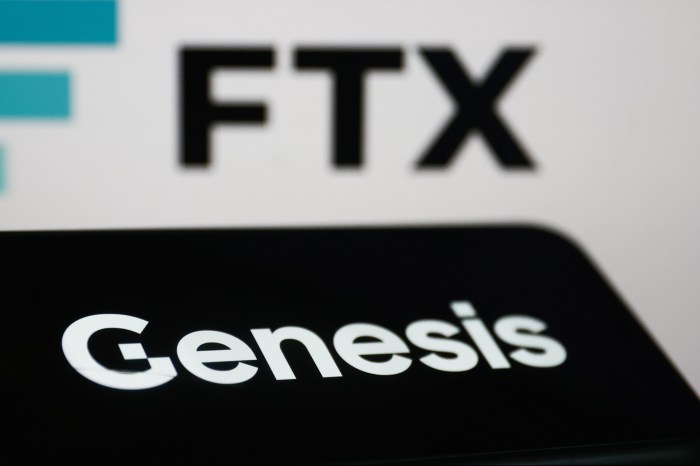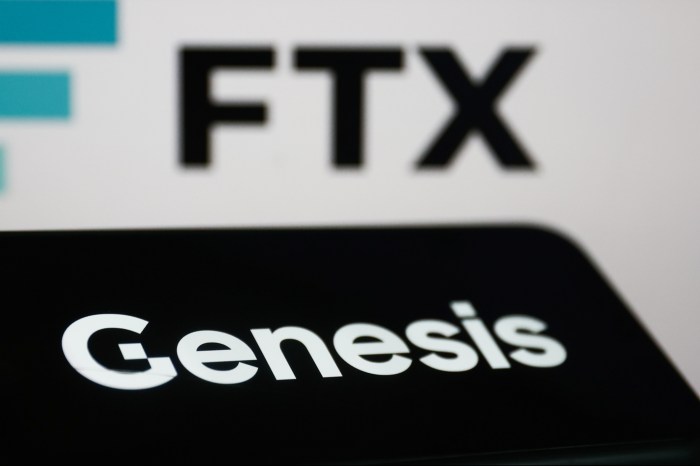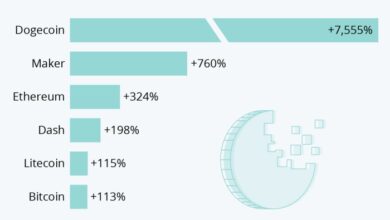
Genesis Crypto Lending Files for Bankruptcy Protection
Genesis crypto lending filing for bankruptcy protection – Genesis Crypto Lending, a major player in the cryptocurrency lending market, has filed for bankruptcy protection. This event sends shockwaves through the crypto industry, highlighting the fragility of the ecosystem and the potential consequences of over-leveraging and risk management failures.
The bankruptcy filing comes on the heels of the FTX collapse, which had a significant impact on Genesis’s operations. The company’s exposure to FTX, coupled with liquidity issues and market volatility, led to its financial distress. Genesis’s downfall serves as a stark reminder of the inherent risks associated with cryptocurrency lending and the importance of robust risk management practices.
Genesis Crypto Lending
The recent bankruptcy filing of Genesis Global Trading, a prominent player in the cryptocurrency lending market, has sent shockwaves through the industry. This event serves as a stark reminder of the inherent risks associated with digital assets and the fragility of the crypto ecosystem.
Genesis Crypto Lending: A Brief Overview
Genesis Global Trading, a subsidiary of Digital Currency Group (DCG), emerged as a significant force in the cryptocurrency lending market. Founded in 2013, the company initially focused on providing institutional investors with access to digital assets and trading services. Over time, Genesis expanded its offerings to include lending, custody, and prime brokerage services.Genesis’s key services catered to a diverse clientele, ranging from hedge funds and family offices to cryptocurrency exchanges and miners.
The company facilitated borrowing and lending of digital assets, enabling institutions to leverage their holdings for various purposes, including arbitrage, short-selling, and yield generation.
Genesis’s Role in the Crypto Lending Market
Genesis played a crucial role in the cryptocurrency lending market by providing liquidity and facilitating transactions between institutional investors. The company’s platform enabled borrowers to access capital for various purposes, while lenders could earn interest on their digital assets. This ecosystem thrived on the belief that cryptocurrencies would continue to grow in value and adoption, making lending and borrowing a viable and profitable strategy.
Timeline of Events Leading to Bankruptcy
The events leading to Genesis’s bankruptcy filing can be traced back to the collapse of FTX, a major cryptocurrency exchange. The FTX implosion, which occurred in November 2022, triggered a domino effect across the industry, exposing vulnerabilities and highlighting the interconnectedness of various crypto businesses.
The news of Genesis Crypto Lending filing for bankruptcy protection serves as a stark reminder that even in the seemingly secure world of finance, things can go wrong. It’s a cautionary tale for investors, but it also highlights the need for vigilance when making major financial decisions.
Just as experts warn homebuyers of red flags beyond climbing interest rates , it’s crucial to be aware of potential risks and to thoroughly research any investment opportunity before committing. The Genesis case underscores the importance of due diligence and diversification, especially in volatile markets like cryptocurrency.
- November 2022:FTX’s collapse sent shockwaves through the cryptocurrency market, leading to a sharp decline in prices and a loss of confidence in the industry. Genesis, which had significant exposure to FTX, faced significant losses as a result of the exchange’s failure.
- January 2023:Genesis halted withdrawals and redemptions from its lending products, citing “abnormal market conditions” and the impact of the FTX collapse. This move signaled serious financial difficulties for the company.
- January 2023:DCG, Genesis’s parent company, announced that it would provide a $140 million loan to Genesis to help stabilize the situation. However, this loan proved insufficient to address the company’s mounting liabilities.
- January 2023:Genesis filed for Chapter 11 bankruptcy protection in the United States, seeking to restructure its debt and navigate the complexities of its financial situation.
Causes of Genesis’s Bankruptcy
Genesis’s bankruptcy filing in January 2023 sent shockwaves through the cryptocurrency industry. The company, a major player in crypto lending and trading, had been a trusted name in the space for years. Its collapse exposed vulnerabilities in the crypto lending market and highlighted the risks associated with over-leveraging and exposure to volatile assets.
The news of Genesis Crypto Lending filing for bankruptcy protection has sent shockwaves through the crypto community. It’s a stark reminder of the volatility and risks inherent in the space. While this event highlights the fragility of centralized lending platforms, it also underscores the potential for innovation in decentralized finance (DeFi).
This is where figures like Gavin Wood, a prominent figure in the Ethereum ecosystem, come in. His focus on chain mergers and acquisitions, as explored in this article , could offer a path towards a more resilient and interconnected DeFi landscape.
The lessons learned from the Genesis collapse might ultimately lead to a more robust and decentralized future for crypto finance.
Exposure to FTX
The primary factor contributing to Genesis’s downfall was its significant exposure to FTX, a major cryptocurrency exchange that went bankrupt in November 2022. Genesis had lent substantial funds to FTX, which ultimately became illiquid and unable to repay its obligations.
This exposure to FTX’s collapse resulted in a substantial loss for Genesis, severely impacting its financial stability.
Illiquidity Issues
In addition to its exposure to FTX, Genesis faced significant illiquidity issues in the aftermath of the broader crypto market downturn. As investor confidence in the crypto market waned, withdrawals from Genesis’s lending platform surged, leading to a shortage of funds available to meet these demands.
The company’s reliance on borrowed funds and its inability to quickly liquidate assets exacerbated these liquidity problems.
The news of Genesis crypto lending filing for bankruptcy protection has sent shockwaves through the crypto industry. It’s a stark reminder of the risks involved in this rapidly evolving space, and it’s interesting to see how Vitalik Buterin, the co-founder of Ethereum, addressed these challenges in a recent interview on Bloomberg’s Studio 10, bloombergs studio 10 ethereum co founder vitalik buterin.
His insights on the future of blockchain technology and its potential to revolutionize finance are particularly insightful, especially in light of the current turmoil in the crypto market. The Genesis situation underscores the need for responsible innovation and robust risk management within the crypto ecosystem.
Market Volatility
The cryptocurrency market is known for its volatility, and Genesis’s operations were significantly affected by the sharp decline in crypto prices in 2022. The value of the crypto assets held by Genesis plummeted, leading to significant losses and further exacerbating its financial distress.
This volatility exposed the inherent risks associated with crypto lending and trading, particularly in a bear market.
Over-Leveraging and Risk Management Practices
Genesis’s aggressive lending practices, including over-leveraging, played a significant role in its downfall. The company’s decision to lend substantial funds to FTX, a risky venture, and its reliance on borrowed funds to meet liquidity demands exposed it to significant risks.
Critics argue that Genesis’s risk management practices were inadequate, particularly in light of the inherent volatility in the crypto market.
Comparison with Other Crypto Lending Platforms
Genesis’s situation is not unique in the crypto lending space. Other platforms, such as Celsius Network and Voyager Digital, have also faced similar challenges, including exposure to volatile assets, liquidity issues, and over-leveraging. These platforms also experienced significant losses and were forced to file for bankruptcy protection.
The collapse of these platforms highlights the systemic risks within the crypto lending market and the need for stricter regulations and more robust risk management practices.
Impact of Genesis’s Bankruptcy on the Crypto Industry: Genesis Crypto Lending Filing For Bankruptcy Protection
The collapse of Genesis, a major cryptocurrency lender, has sent shockwaves through the crypto industry, raising concerns about the stability and future of the sector. The bankruptcy filing has implications for investor confidence, liquidity, and market sentiment, potentially impacting other crypto lending platforms and shaping the regulatory landscape.
Investor Confidence and Market Sentiment
Genesis’s bankruptcy has significantly eroded investor confidence in the cryptocurrency market. The event serves as a stark reminder of the inherent risks associated with crypto lending, highlighting the fragility of the ecosystem. Investors are now more cautious, questioning the stability of the entire crypto industry and the reliability of lending platforms.
The decline in investor confidence has led to a sell-off in the market, pushing down the prices of major cryptocurrencies, and exacerbating market volatility.
Legal and Regulatory Considerations
Genesis’s bankruptcy filing has triggered a complex legal and regulatory landscape, raising questions about the future of crypto lending and the role of regulators in this evolving space. The proceedings involve navigating legal complexities, addressing creditors’ claims, and potentially influencing future regulatory frameworks.
Legal Proceedings and Creditors’ Claims
The legal proceedings surrounding Genesis’s bankruptcy will involve several key aspects, including the filing process, creditors’ claims, and potential legal disputes. The bankruptcy filing itself is a formal legal process that allows a company to reorganize its finances or liquidate its assets under the supervision of a court.
In Genesis’s case, the filing will likely involve a Chapter 11 bankruptcy, which aims to restructure the company’s debts and allow it to continue operating.Creditors’ claims will be a central aspect of the proceedings. Genesis’s creditors, including individuals, institutional investors, and other companies, will file claims detailing the amounts they are owed.
The bankruptcy court will then determine the validity and priority of these claims. The process of resolving creditors’ claims can be lengthy and complex, potentially leading to legal disputes over the validity and priority of various claims.
Regulatory Scrutiny and Potential Changes, Genesis crypto lending filing for bankruptcy protection
The bankruptcy of Genesis has prompted increased regulatory scrutiny of the crypto lending sector. Regulators are investigating Genesis’s practices and potentially considering changes to the regulatory landscape for crypto lending. The Securities and Exchange Commission (SEC) is investigating whether Genesis’s lending products violated securities laws, while other regulators are examining the company’s risk management practices and its compliance with anti-money laundering regulations.The investigations and potential regulatory changes could significantly impact the future of crypto lending.
Regulators may impose stricter requirements for crypto lending platforms, including increased capital requirements, stricter risk management standards, and enhanced disclosure requirements. These changes could potentially lead to increased costs for crypto lending platforms and potentially limit the availability of crypto lending products.
Crypto Lending Regulations in the United States and Globally
The legal and regulatory landscape surrounding cryptocurrency lending is still evolving, particularly in the United States. While there is no specific federal law governing crypto lending, the SEC and other regulators are applying existing securities laws to crypto lending activities.
This has led to uncertainty for crypto lending platforms and investors.Globally, different jurisdictions have adopted varying approaches to regulating crypto lending. Some countries, such as Singapore and Switzerland, have implemented specific regulatory frameworks for crypto lending, while others are still developing their approaches.
The lack of consistent global regulations poses challenges for crypto lending platforms operating across multiple jurisdictions.The bankruptcy of Genesis has highlighted the need for clear and consistent regulations in the crypto lending sector. Regulators are facing the challenge of balancing innovation with investor protection, while also ensuring the stability of the financial system.
The outcome of the regulatory response to Genesis’s bankruptcy will likely shape the future of crypto lending for years to come.
Lessons Learned from Genesis’s Bankruptcy

The collapse of Genesis Crypto Lending serves as a stark reminder of the inherent risks associated with the cryptocurrency industry. While the events leading up to its bankruptcy are complex, several key lessons can be gleaned from this experience, offering valuable insights for both lending platforms and investors.
These lessons emphasize the importance of robust risk management practices, transparent operations, and proactive regulatory compliance.
Risk Management Practices
The Genesis case underscores the critical need for comprehensive and rigorous risk management frameworks within the cryptocurrency lending space. While traditional financial institutions have long established such frameworks, the nascent nature of the crypto industry has sometimes led to a less structured approach.
- Diversification of Lending Portfolio: Genesis’s reliance on a concentrated portfolio of loans, primarily to Three Arrows Capital (3AC), exposed it to significant counterparty risk. Diversifying lending portfolios across a wider range of borrowers, including those with strong financial track records and diverse collateral types, can help mitigate such risks.
- Stress Testing and Scenario Planning: Effective risk management requires proactive stress testing and scenario planning. This involves simulating various market conditions, including sudden price drops or liquidity crises, to assess the resilience of lending operations. Such exercises can help identify potential vulnerabilities and develop contingency plans.
- Robust Collateral Management: Genesis’s reliance on illiquid crypto assets as collateral, including those susceptible to rapid price fluctuations, contributed to its downfall. Lending platforms should establish clear collateral valuation methodologies, including regular revaluations, and consider utilizing overcollateralization strategies to protect against potential losses.
Transparency and Disclosure
Transparency is paramount in fostering trust and confidence in the cryptocurrency lending ecosystem. Genesis’s lack of transparency regarding its lending activities and financial health contributed to the erosion of investor confidence.
- Clear and Timely Disclosure of Lending Activities: Lending platforms should provide investors with clear and timely disclosures about their lending activities, including loan terms, borrower profiles, and collateral types. This transparency enables investors to make informed decisions about their investments.
- Regular Financial Reporting and Audits: Independent audits and regular financial reporting are essential for demonstrating the financial health and operational transparency of lending platforms. This practice helps build investor confidence and provides a basis for independent verification of financial data.
- Open Communication with Investors: Maintaining open and transparent communication with investors is crucial. This involves promptly addressing investor inquiries, providing updates on market conditions and lending operations, and proactively disclosing any potential risks or challenges.
Regulatory Compliance
The cryptocurrency industry is rapidly evolving, and regulatory landscapes are constantly changing. Lending platforms must proactively adapt to these changes and ensure compliance with relevant regulations.
- Understanding Applicable Regulations: Lending platforms should thoroughly understand the applicable regulations in their jurisdictions, including those related to anti-money laundering (AML), know-your-customer (KYC), and consumer protection. This understanding is crucial for ensuring compliance and mitigating potential legal risks.
- Proactive Engagement with Regulators: Lending platforms should engage proactively with regulators to understand evolving regulatory expectations and to contribute to the development of clear and robust regulatory frameworks for the crypto industry. This approach fosters collaboration and helps ensure the industry operates within a stable and transparent environment.
- Compliance Monitoring and Reporting: Lending platforms should establish robust compliance monitoring and reporting systems to track their adherence to relevant regulations. This involves conducting regular compliance reviews, implementing appropriate controls, and maintaining detailed records for regulatory scrutiny.





